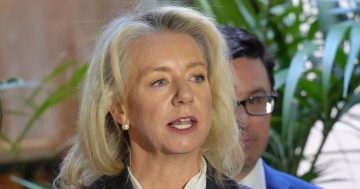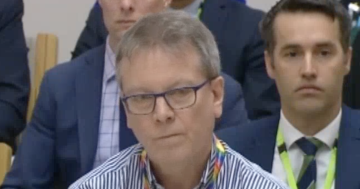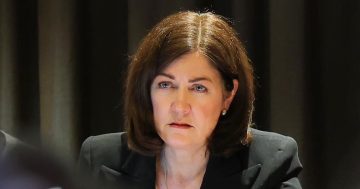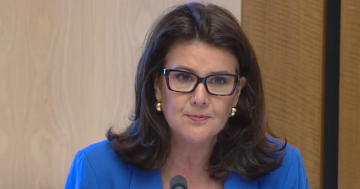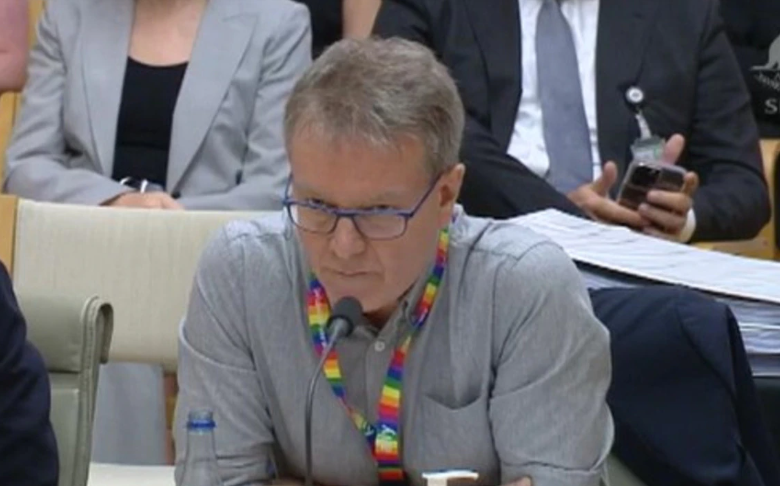
Infrastructure Secretary Jim Betts says he is disgusted by allegations of a ‘hotties list’ being circulated in his department. Photo: Screenshot.
A ‘hotties list’ of young female employees in the Infrastructure Department has eluded bosses, who believe one was made by a group of young males in the graduate intake.
The list is thought to have ranked women by their attractiveness and was circulated among the males employed in the department’s graduate program.
Nationals Senator Bridget McKenzie raised the issue in this week’s Senate Estimates, extracting information about what the department knew about it.
She said such a list had no place in workplaces in this decade.
“The allegations of this type of behaviour would be incredibly concerning for the one-third of women in the graduate program being so depicted,” Senator McKenzie said.
Acknowledging that rumours about the list began circulating in March and led to a formal complaint in May, Infrastructure Secretary Jim Betts said he was disgusted by it. Still, an actual list has not been found, even following an independent investigation.
He said the “severest sanctions available” would be applied if the list was confirmed and its creators identified.
Mr Betts said the existence of such a list was degrading to women and the term ‘hotness’ was a disgusting phrase.
“Allegations were made within our graduates program about concerns that some female grads had that certain male members of the graduate cohort had assembled a list, a degrading list of women which assessed them by their so-called hotness,” Mr Betts said.
“We were unable to substantiate the existence of such a list, which doesn’t mean it doesn’t exist, it just means that we were not able to substantiate it.
“We embarked on a process, thereafter, including my having conversations with all of the female graduates without any males in the room to make sure they were getting all the support that the department could provide.”
Asked if the department had informed its minister, Catherine King, about the alleged list, Mr Betts said he hadn’t as it was his responsibility to handle the matter.
“I haven’t briefed the minister about this issue, no,” he said.
“It’s my accountability to fix it. I’m the employer. I’m the accountable authority.
“I’m not sure involving politicians is helpful.”
The department did, however, take advice from former sex discrimination commissioner Kate Jenkins.
A number of sessions were held with the graduates, including with them all together and separately with just the women.
The current cohort, embedded in the department since February, has 35 graduates, two-thirds are male and are mostly aged below 30.
With their employment, the graduates all received training in the Australian Public Service’s values system and respect at work.
Mr Betts said that gender balance was nowhere near appropriate for his department.
“We will never have a future graduate program where the gender balance is two-thirds male and one-third female,” he said.
“It is unacceptable within a department, which is 60 per cent female overall, and among senior executive services 52 per cent female.
“We’ve learnt some lessons from this and one of those is around having gender balance at all levels and in all cohorts.”
Mr Betts was also asked about allegations a department employee had been harassed and followed or intimidated when leaving work.
The secretary urged the senator not to ask questions that could lead to the identification of employees.
He suggested an investigation might be underway into the allegations, saying such allegations were taken extremely seriously.
“Our first course of action is to support the person making the allegation or expressing the concern,” Mr Betts said, “including providing pastoral care for that person and ensuring that, should they wish to pursue it, for instance, with the police, that they are supported in doing so.
“We also need to and have taken steps to ensure that everybody in that area is reminded of their responsibilities to respect each other, to comply with the code of conduct, to show respect, especially to women, that misogynistic behaviour and sexual harassment are totally unacceptable in the workplace.”















